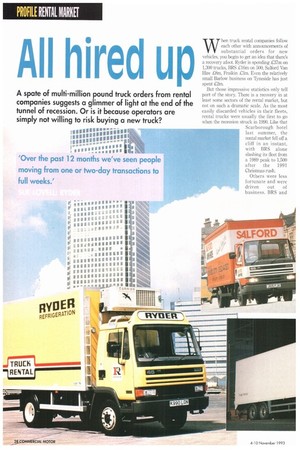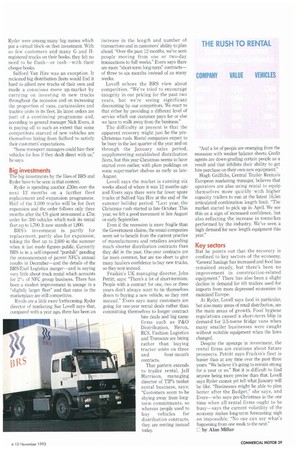All hired
Page 30

Page 31

If you've noticed an error in this article please click here to report it so we can fix it.
A spate of multi-million pound truck orders from rental companies suggests a glimmer of light at the end of the tunnel of recession. Or is it because operators are simply not willing to risk buying a new truck?
When truck rental companies follow each other with announcements of substantial orders for new vehicles, you begin to get an idea that there's a recovery afoot. Ryder is spending aim on 1,300 trucks, BRS £16m on 500, Salford Van Hire ..£8m, Fraikin £3m. Even the relatively small Barlow business on Tyneside has just spent £2m.
But those impressive statistics only tell part of the story, There is a recovery in at least some sectors of the rental market, but not on such a dramatic scale, As the most easily discarded vehicles in their fleets, rental trucks were usually the first to go when the recession struck in 1990. Like that Scarborough hotel last summer, the rental market fell off a cliff in an instant, with BRS alone slashing its fleet from a 1989 peak to 1,500 after the 1991 Christmas rush.
Others were less fortunate and were driven out of business. BRS and Ryder were among many big names which put a virtual block on fleet investment. With so few customers and many G and Hregistered trucks on their books, they felt no need to be flush or rash—with their cheque books.
Salford Van Hire was an exception. It reckoned big distribution fleets would find it hard to afford new trucks of their own and made a conscious move up-market by carrying on investing in new trucks throughout the recession and on increasing the proportion of vans. curtainsiders and tractive units in its fleet. Its latest orders are part of a continuing programme and, according to general manager Nick Evers, it is paying off to such an extent that some competitors starved of new vehicles are themselves hiring from Salford to satisfy their customers' expectations.
"Some transport managers could hire their vehicles for less if they dealt direct with us," he says.
Big investments
The big investments by the likes of BRS and Ryder have to be seen in that context.
Ryder is spending another .£30m over the next 12 months on a further fleet replacement and expansion programme. Half of the 1,000 trucks will be for fleet expansion and the order follows only three months after the US giant announced a rim order for 300 vehicles which took its rental fleet up to 1,700. It now stands at 1,800.
BRS's investment is partly for replacement, partly also for expansion, taking the fleet up to 2,600 in the summer when it last made figures public. Currently BRS is in a self-imposed "purdah" pending the announcement of parent NFC's annual results in December—and the details of the BRS/Exel Logistics merger—and is saying very little about truck rental which accounts for 2°. of NFC group business. There has been a modest improvement in useage in a "slightly larger fleet" and that rates in the marketplace are still competitive.
Rivals are a little more forthcoming. Ryder director of marketing Sue Lovell says that, compared with a year ago, there has been an increase in the length and number of transactions and in customers' ability to plan ahead. "Over the past 12 months, we've seen people moving from one or two-day transactions to full weeks." Evers says there are more "short-term long-term" contracts— of three to six months instead of as many weeks.
Lovell echoes the BRS view about competition. "We've tried to encourage integrity in our pricing for the past two years, but we're seeing significant discounting by our competitors. We react to that either by providing a different level of service which our customer pays for or else we have to walk away from the business."
The difficulty at present is that the apparent recovery might just be the preChristmas rush. Rental companies expect to be busy in the last quarter of the year and on through the January sales period, supplementing established distribution fleets, but this year Christmas seems to have started even earlier, with plum puddings on some supermarket shelves as early as late. August.
Lovell says the market is running six weeks ahead of where it was 12 months ago and Evers says there were far fewer spare trucks at Salford Van Hire at the end of the summer holiday period. "Last year, the Christmas rush started in late October This year, we felt a good movement in late August or early September.
Even if the recession is more fragile than the Government claims, the rental companies seem set to benefit from the current practice of manufacturers and retailers awarding much shorter distribution contracts than they did in the past. One-year contracts are far more common, but are too short to give many hauliers confidence to buy new trucks, so they rent instead.
Fraikin's UK managing director, John Pettitt, says: "There's a lot of short-termism. People with a contract for one, two or three years don't always want to tie themselves down to buying a new vehicle, so they rent instead." Evers says many customers are going for one-year rental deals rather than committing themselves to longer contract hire deals and big name firms such as P&O Distribution, Heron, RCS, Fashion Logistics and Transcare are hiring rather than buying tractor units on three and four-month contracts.
That pattern extends to trailer rental. Jeff Harrison, managing director of TIP's tanker rental business, says: "Customers seem to be shying away from longterm commitments, so whereas people used to buy vehicles for distribution contracts, they are renting instead today. And a lot of people are emerging from the recession with weaker balance sheets. Credit agents are down-grading certain people as a result and that inhibits their ability to get hire purchase on their own new equipment."
Hugh Griffiths, Central Trailer Rentco's European marketing manager, believes that operators are also using rental to equip themselves more quickly with higher capacity trailers to run at the latest 16.5m articulated combination length limit. "The market started to pick up in April. We see this as a sign of increased confidence, but also reflecting the increase in tonne/km performed by the industry. We've seen a high demand for new length equipment this year."
Key sectors
But he points out that the recovery is confined to key sectors of the economy. "General haulage has increased and food has remained steady, but there's been no improvement in construction-related equipment." There has also been a slight decline in demand for tilt trailers used for imports from more depressed economies in mainland Europe.
At Ryder, Lovell says food in particular, but also many areas of retail distribution, are the main areas of growth. Food hygiene regulations caused a short-term blip in demand for 3.5-tonne fridge vans when many smaller businesses were caught without suitable equipment when the laws changed.
Despite the upsurge in investment, the rental firms are cautious about future prospects. Pettitt says Fraikin's fleet is busier than at any time over the past three years. "We believe it's going to remain strong for a year or so." But it is difficult to find anyone being more precise than that. Lovell says Ryder cannot yet tell what January will be like. "Businesses might be able to plan better after the Budget," she says, and Evers—who says pre-Christmas is the one time when all rental firms ought to be busy—says the current volatility of the economy makes long-term forecasting nigh on impossible. "No one can say what's happening from one week to the next."
E by Alan Millar




























































































